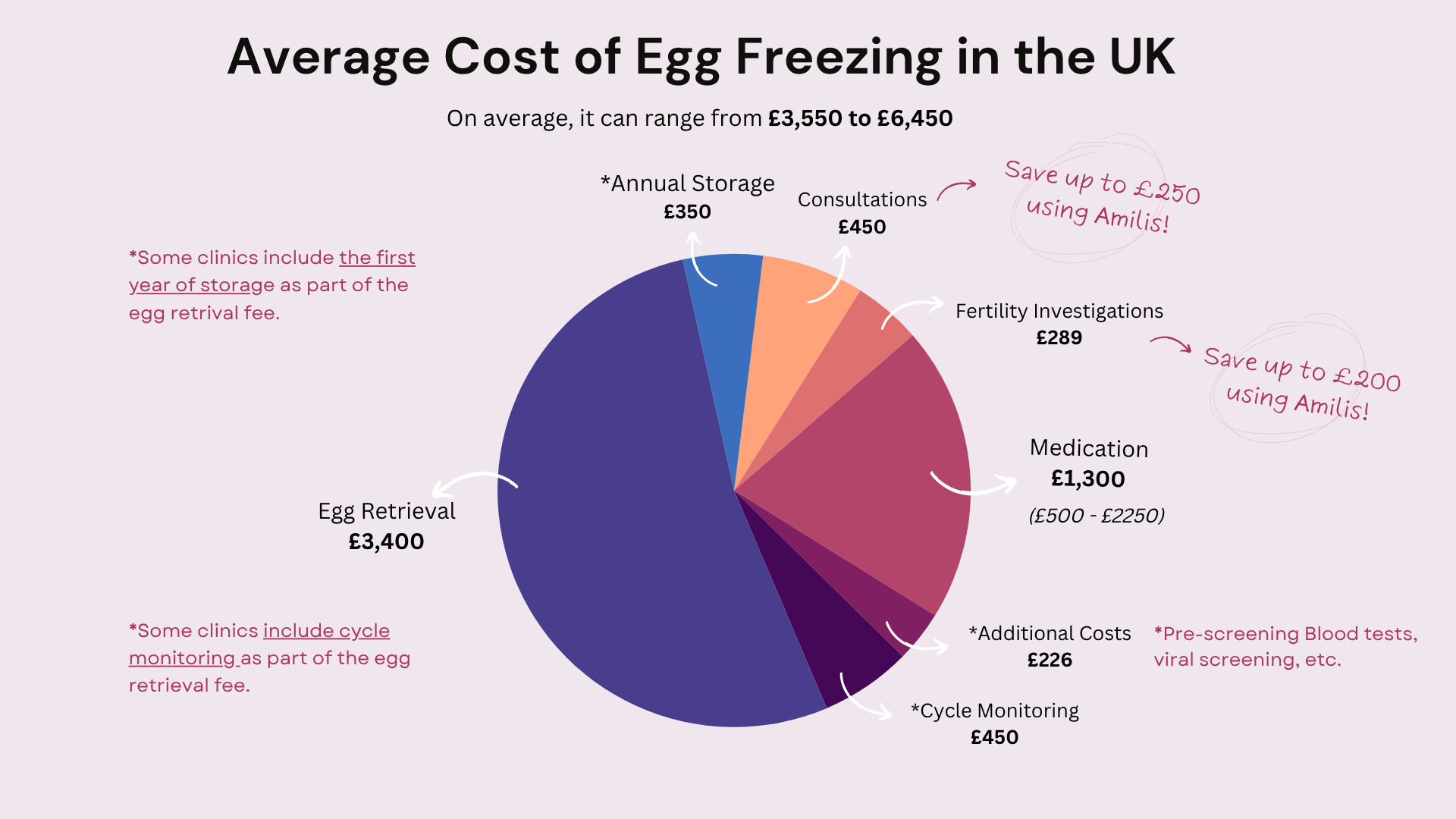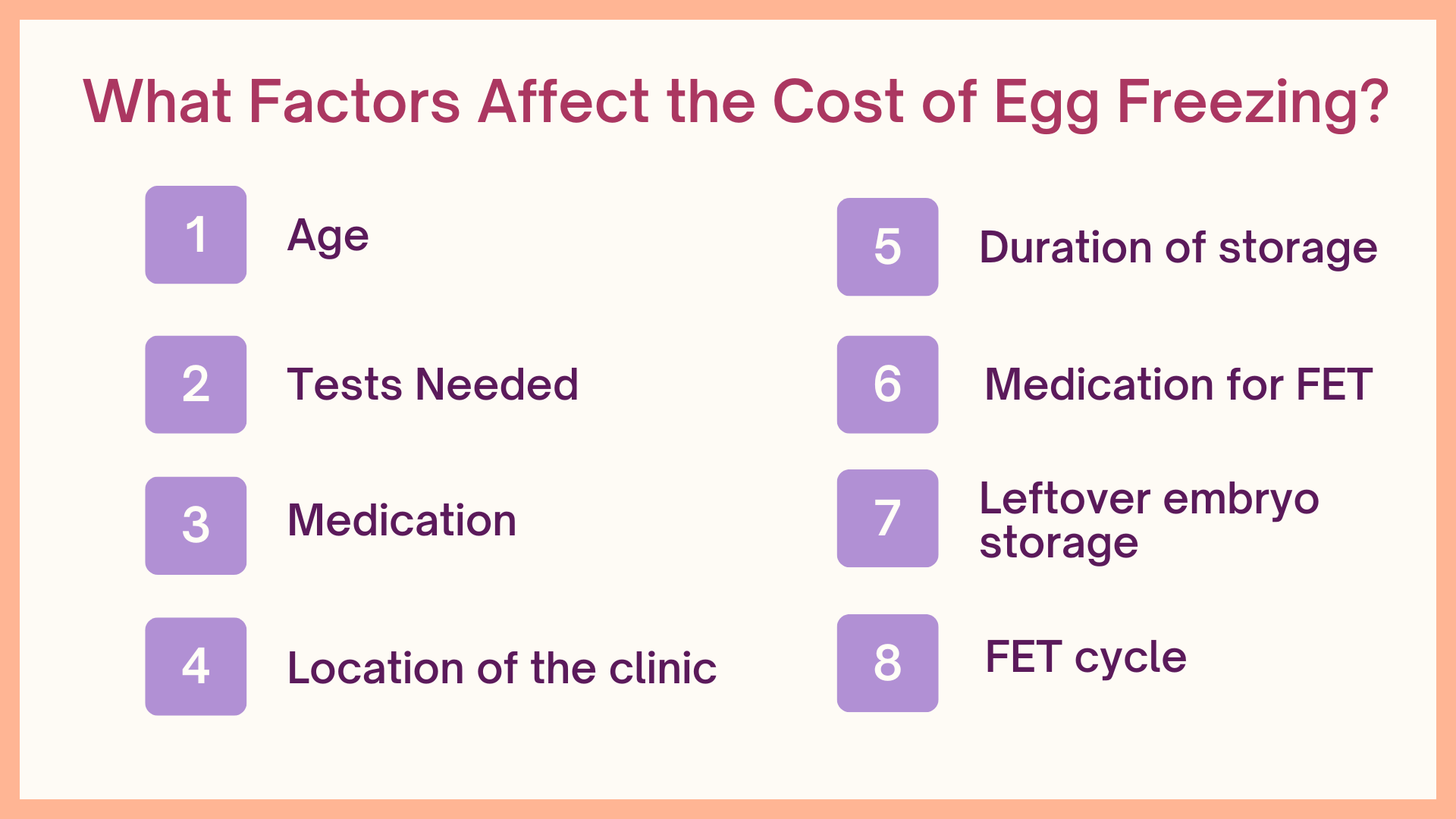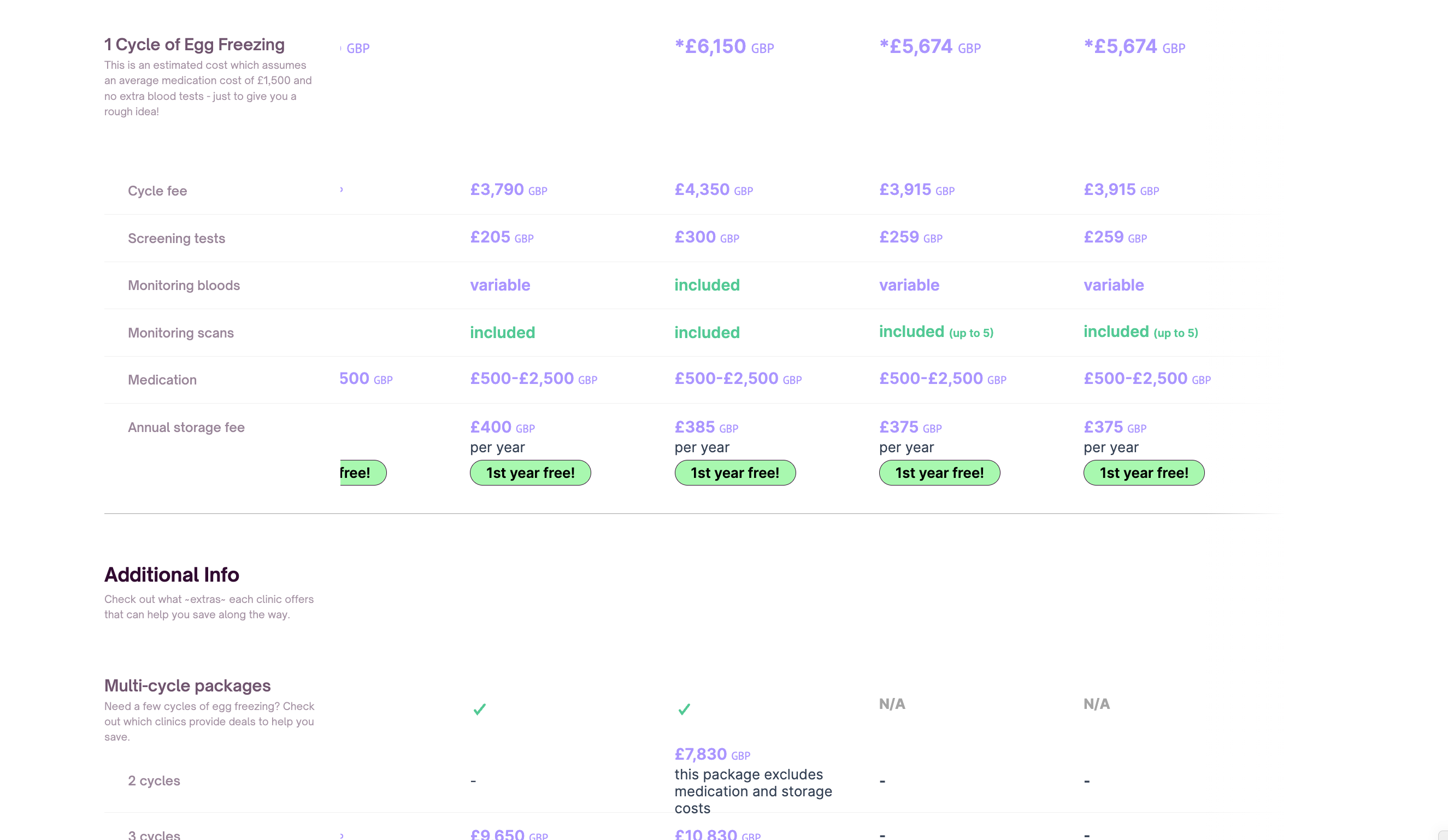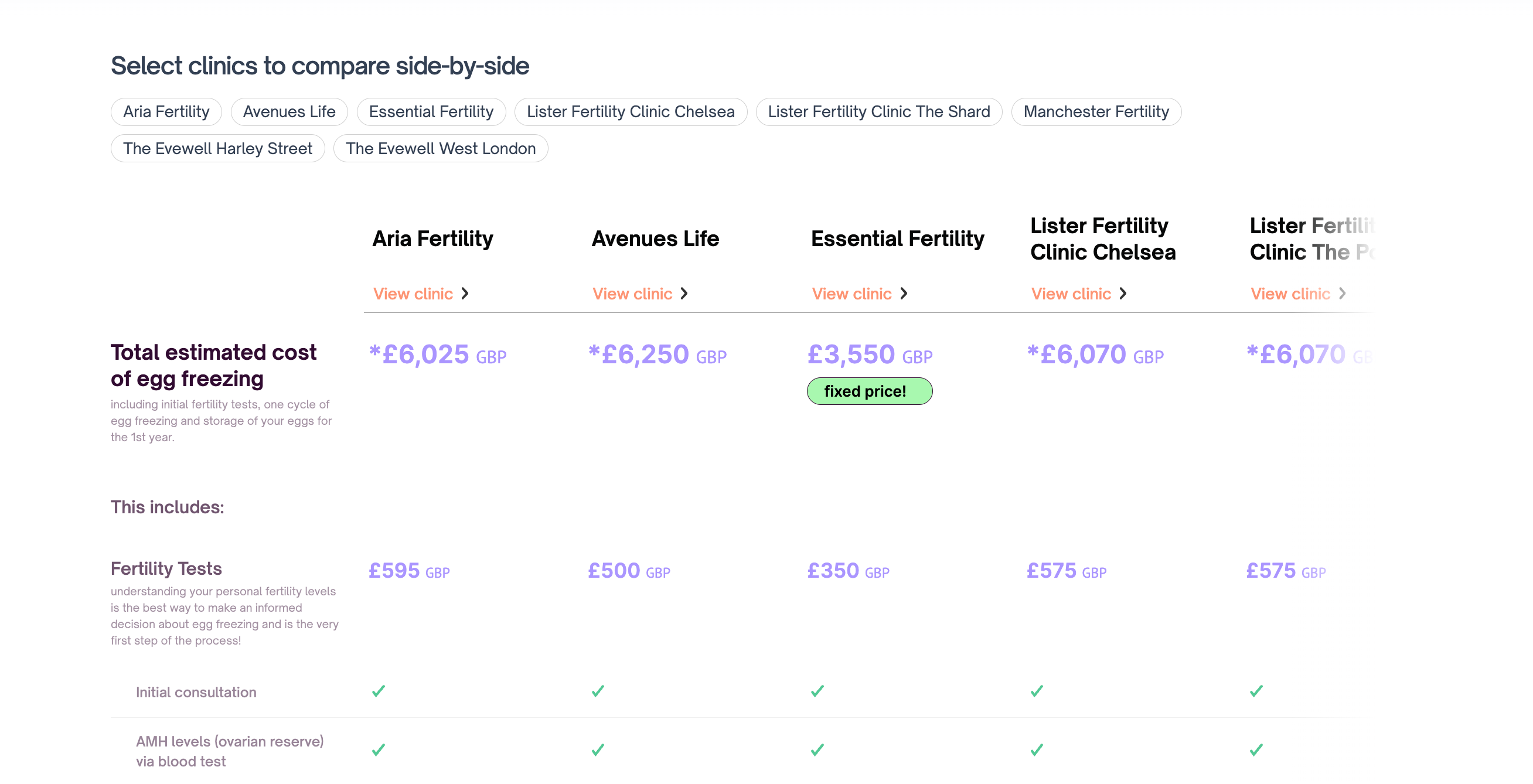Contents
- What is egg freezing?
- Why might someone consider egg freezing?
- How much does it cost to freeze your eggs in the UK?
- How much does it cost to freee your eggs in London?
- Breaking down the cost of egg freezing in the UK?
- Total estimated cost of egg freezing in the UK
- What factors affect the cost of egg freezing in the UK?
- What are the success rates for egg freezing in the UK?
- What is the timeline for egg freezing?
- Do you do IVF after freezing eggs?
- How long can you freeze your eggs in the UK?
- What are some affordable options for egg freezing in the UK?
- How can I find a clinic that offers egg freezing in the UK?
- How Amilis can help you save on your egg freezing costs
- Frequently asked questions
In an eggshell...
- The total cost of egg freezing in the UK is estimated to range from £3,550 to £6,450.
- This includes consultations, fertility tests, screening, monitoring and blood tests, egg retrieval with variable costs such as medication and storage.
- Affordable egg-freezing options in the UK include going via the NHS, Amilis, using insurance, and going for egg-sharing programmes
Egg freezing is a personal decision, yes, but also a financial one.
And why do we say so? Because, as with any other procedure in healthcare, there are some variables that factor in.
Because, let’s face it: The costs may differ based on the location, clinic, medication, age and any other factor that may end up affecting your egg-freezing cycle.
Having an estimate or an understanding of the costs and the variables can help you budget for it or find the right resources that help reduce costs.
The TLDR? We at Amilis did all the research, talked to clinics and doctors, searched up best financing options and curated this guide to help you navigate the costs of egg freezing in the UK.
Let’s dive in!
What is Egg Freezing?
Egg freezing, also called oocyte cryopreservation, is a process where your ovaries are stimulated to produce multiple mature eggs, which are then retrieved and cryopreserved for future use.
Here’s a quick breakdown of the process:
🔍 Pre-treatment tests and scans
You’ll start with a few simple checks like blood tests and a pelvic scan to understand your hormone levels and your ovarian reserve. This helps tailor the process to your body.
💉 Ovarian stimulation
For around 10–12 days, you’ll give yourself daily hormone injections to help your ovaries grow more eggs than your usual menstrual cycle. You’ll come in for a few check-ups and scans during this time so the team can monitor how your body is responding.
📆 Egg maturation and trigger shot
Once your follicles are ready, you’ll take a final “trigger” injection to help the eggs mature and get them ready for collection. The timing here is key, so you’ll get clear guidance on when to take it, and when the egg retrieval surgery will happen.
Why might someone Consider Egg Freezing?
There may be several reasons why you may consider egg freezing as an option for your reproductive health. Some common ones include:
- You’re currently focusing on your career or aren’t ready to have a child yet and want to preserve your fertility
- You’re 25-35 years or older
- You know someone in your circle who’s choosing this option or has gone through it
- You’ve had your GP recommend/ or you’ve opted for fertility tests such as Anti Muillerian Hormone (AMH- gives us a sneak peek into our ovarian reserve) and Antral Follicle Count (AFC- an ultrasound to check our ovarian reserve)
- You’re choosing to donate your eggs or opting for an egg-sharing programme
- You are undergoing chemotherapy and have been advised egg freezing prior to treatment
- You are a female transitioning to a male and need to preserve fertility before hormone therapy
Regardless of how common or unique your cause is, egg freezing is an option that lets you pool, freeze, and utilise these eggs at a later point in your life.
🩺 Egg retrieval
About 36 hours after your trigger shot, you’ll come in for the egg collection. It’s a short procedure under anaesthesia, and most people are kept under observation for a couple of hours before being cleared to go home. On the same day, you’ll also be informed by your clinic of the number of eggs and mature ones retrieved.
❄️ Freezing and storage
The mature eggs are frozen using a fast-freezing method called vitrification. They’re then safely stored until you’re ready to use them in the future.
Is Egg Freezing and IVF The Same?
Egg freezing and IVF share some steps, like ovarian stimulation and egg retrieval, but they are not the same process. In IVF, the eggs are fertilised with sperm right after retrieval to create embryos. In egg freezing, the eggs are frozen unfertilised and stored for later use. With frozen eggs, ICSI is done for fertilisation rather than IVF.
How Much Does it Cost to Freeze Your Eggs in the UK?

The total cost of egg freezing in the UK varies depending on the clinic, your treatment protocol, and whether you're buying an all-inclusive package or paying for each step separately. Based on our partner clinics at Amilis, the average cost of a cycle of egg freezing in the UK (including consultations, scans, blood tests, and egg retrieval) typically ranges from £3,550 to £6,450.
On top of that, medication costs can range from £500 to £2,500, depending on your dosage and individual response to stimulation. Annual storage fees are also an ongoing cost, usually around £300 to £450 per year.
If you also factor in the next step, which is using your frozen eggs in the future, you'll also need to go through a frozen egg thaw transfer cycle or a frozen embryo transfer (FET), which includes thawing, fertilisation (via ICSI), and transferring the embryo. This can cost between £2,150 and £3,800.
Hence, the overall cost range for an egg freezing cycle- taking everything into account — treatment, medication, and a single FET cycle is approximately £7975-£9800.
This does not include additional storage beyond the first year or future FET cycles if needed.
How much does it cost to Freeze your Eggs in London?
The financial aspect of egg freezing includes the cost of consultations, the actual freezing cycle, the medications, fertility tests, and the cost of keeping the eggs frozen until they’re used.
On average, an egg-freezing cycle in London costs around £5000-£7000. This varies on the basis of clinics but includes the cost of all aspects of the cycle, such as fertility tests, medication, and so on.
Breaking Down the Cost of Egg Freezing in the UK (By Treatment Steps)
Egg freezing can be a significant financial investment, but understanding the stages, and where the costs factor in can help you plan better. For instance, at Amilis, you can get started on your pre-treatment tests, such as AMH (Anti-Mullerian Hormone), or a pelvic ultrasound, and then start your cycle at one of our partner clinics.
So, here’s a breakdown of what the different stages cost, the variable costs that come in, and the pricing overall, so you know exactly what to expect at each step.
1. Egg Freezing Pre-Treatment Costs
Before you plan out your egg freezing protocol or stimulation, you’ll first go through some fertility checks. These include blood tests and scans to help understand your hormone levels and ovarian reserve.
This helps clinics and doctors understand your medical history and design a protocol tailored to your body and needs.
Some clinics offer fixed-price fertility MOTs or pre-treatment packages with one bundled cost for everything, while others charge separately for each item.
2. Egg Freezing Treatment Costs
Once your tests are complete, you’ll move into the treatment phase. This includes everything from hormone stimulation and nurse consultations to monitoring appointments, the egg retrieval procedure, and finally, freezing your eggs.
Some clinics offer an “egg freezing package” that covers most of these steps in one bundle. Others may charge separately for each part, which can add up quickly. At this point, your clinic should give you a clear, itemised breakdown of what’s included and what might cost extra — so you know exactly what you’re paying for and can avoid unexpected charges.
Here are the key services typically included in this stage of the journey:
3. Post-Treatment Costs: Using Your Frozen Eggs
While most of the costs are upfront during testing, stimulation, and egg retrieval, it’s easy to overlook the expenses that come later. One of the biggest ones is egg storage, which typically costs around £360–£450 per year. Some clinics include the first year for free, but if you plan to use your eggs a few years down the line, these costs can add up — for example, three years of storage could come to £1,080–£1,350.
When you’re ready to use your frozen eggs, you’ll go through what’s often called a frozen egg thaw transfer cycle or a frozen embryo transfer (FET) cycle. This involves thawing the eggs, fertilising them with partner or donor sperm, and then transferring the resulting embryo into the uterus.
Total Estimated Cost of Egg Freezing in the UK
Here’s a rough estimate of what one full egg freezing journey might look like, including the option to use your eggs later:
Keep in mind that this is excluding any additional years of egg storage between the egg retrieval and the frozen embryo transfer.
What Factors Affect the Cost of Egg Freezing?

There are some variable costs in each egg-freezing cycle as they depend on individual circumstances, personal medical history, and so on. These include:
Age
As we age, it’s natural for our egg quality and quantity to decline. It’s important to note that as we age, the number of eggs recruited during a menstrual cycle also reduces, thus reducing the chances of retrieving more eggs in a single cycle.
Or if you have a history of low ovarian reserve, you may also be asked to undergo multiple cycles to collect more eggs for freezing.
Tip: We recommend you to discuss with your healthcare provider about the possibility of multiple cycles. This helps manage expectations and costs, as some clinics offer reduced prices for multiple-cycle packages.
Tests needed
In general, some HFEA-mandated tests are needed before an egg-freezing cycle. If you happen to have any pre-existing conditions or need additional tests, the cost may vary.
Medication variability
Medication protocols for egg freezing are personalised based on your follicle growth. During the cycle, you will be asked to come in for routine ultrasound scans, which help doctors decide and modify the protocol if necessary.
Location of the Clinic
The location of your clinic matters. Since you would have to check in with the doctor multiple times throughout your cycle, this would add to the overall budget.
Duration of Egg Storage
Egg storage comes with a fixed fee for a year, while some clinics offer reduced pricing for subsequent years of storage. Depending on how many years you plan to store your eggs, the cost may vary.
Medications for frozen embryo transfer
When you decide to use your frozen eggs, the clinic will thaw them and perform ICSI, while you may be prescribed medication at the same time. This is to prepare your uterus for embryo transfer. Depending on the requirements, these costs may add-in.
Leftover frozen embryo storage
For a frozen embryo transfer, usually more than one egg is thawed. This is because embryos are stored in cryolocks, where 2-3 embryos can be stored in a single cryolock.
To understand this better, here’s a hypothetical example. Let’s say you retrieved 8 eggs, of which 5 are mature and inseminated via ICSI, you may end up with 2-3 embryos, which are stored in 1-2 cryolocks.
If you were to use 1 embryo for your transfer, the rest would still have to be refrozen. This could add to the total costs of the cycle.
Frozen embryo transfer cycles
As per HFEA policies, clinics are mandated to transfer a single embryo to the womb. This was brought into place to minimise the risk of multiple births from fertility treatment. As a result, birth rates from single embryo transfers have continued to rise, while the risk of multiple births has reduced.
In cases where good-quality embryos are not available, clinics may use a different protocol or recommend multiple transfer cycles, which may affect costs.
What are the Success Rates for Egg Freezing in the UK?
As per the HFEA, the majority of women freezing their eggs via the NHS were under 35, with almost 90% being under 38.
However, the average age of women freezing their eggs in the UK is 38.
This emphasises the fact that knowing about your success rates by age can significantly help you boost your egg-freezing success rates and your future chances at a healthy pregnancy!
But if we were to look at egg freezing success rates by age, this is how it would be:
For women above 35:
As mentioned above, age is the most important factor affecting egg-freezing success rates.
Women who freeze their eggs before the age of 35 have a much higher chance of success.
Interestingly, when you freeze your eggs matters more, compared to when you use them.
The HFEA advises women to use the IVF success rates for women in their age group (using fresh eggs), rather than egg freezing success rates. This data is likely to better represent the live birth rate from frozen egg fertilisation, especially in women below 35.
📚Also read: Freezing eggs after 35: What you need to know
What is the Timeline for Egg Freezing in the UK?
A single egg freezing cycle typically takes about 2-4 weeks in the UK. You start with fertility tests such as AMH (Anti-Mullerian Hormone) and AFC (Antral Follicle Count) to check your egg reserve and have your first consultation and your protocol mapped out. The medications go on for 10-12 days until egg retrieval surgery.
In between, you will be asked to visit the clinic for routine ultrasound scans, bloodwork and follicle monitoring to ensure the medications are working, and to make any adjustments if needed.
Do you Do IVF after Freezing Eggs?
Yes, after freezing eggs comes the process of IVF- rather, a variation of it known as ICSI or intra-cytoplasmic sperm injection.
The process of IVF involves the egg and its surrounding cells (cumulus cells) being exposed to sperm in a dish, incubated in the lab. But with egg freezing, the surrounding cells are removed before freezing, leaving only ICSI possible.
With ICSI, a single sperm cell is inserted into every egg retrieved and checked for embryo growth. On day 5 or 6 of embryo growth, an embryo transfer is planned to insert the growing embryo into the uterus.
How Long can You Freeze Your Eggs in the UK?
With recent changes in law, you will be able to store eggs, sperm and embryos for up to 55 years from the date of storage. This is under the condition that the consent form is renewed every 10 years.
Since this law came into effect on 1 July 2022, anyone who has frozen their eggs before can contact their clinic and opt for extended storage, and ask for any additional consent forms needed.
What are some Affordable Options for Egg Freezing in the UK?
Ideally, the cheapest option is to get your entire or partial cycle funded by government bodies or insurance. But since this is not the usual case, here are some options that can reduce the cost of your egg-freezing cycle:
- Egg sharing programmes
- Choosing clinics via Amilis
- Opting for insurance coverage
- Opting for NHS funding
- Fertility benefits offered by employers
Let’s discuss each below:
Egg Sharing Programmes
Egg sharing is a unique programme where you freeze your eggs and choose to donate half of them to someone else who needs help starting a family. It’s a personal decision, but one that can make fertility treatment more affordable while also supporting another person's journey.
Here’s how it works: during your egg freezing cycle, the eggs collected are split equally where half are stored for you, and the other half are donated. The clinic will walk you through the process, share a detailed consent form, and explain where your donated eggs may go (either to someone undergoing IVF or for research purposes).
To qualify, you’ll need to meet certain criteria like being within a specific age range, having good ovarian reserve, and meeting general health requirements. If you're eligible, many clinics will cover the entire cost of the egg freezing cycle. You typically only pay for the storage of your own eggs, which brings your out-of-pocket cost down to around £300–£400.
It’s a great option to explore if you're looking to freeze your eggs and want to lower the cost, while also helping someone else.
Choosing Clinics via Amilis
When you choose to start your fertility journey via Amilis, we not only offer a roadmap but also support at every step, with the right resources to make your journey easier.
And here’s how we do it:
- Access to the best fertility clinics in the UK: Free consultations with top fertility clinics in London and the UK- at your convenience, with little to no waiting times
- Get expert consultations: Get matched with the right doctors, and free doctor consultations when you choose via Amilis
- Discounted fertility tests: Get your fertility tested at a fraction of the cost of private clinics and with no waiting times - Get an AMH test (£80) and full hormone panel (£130), with a free personalised report explaining what the results mean, and free follow-up consultations
- Support and guidance: Free 1-1 calls with Amilis experts to discover the next steps
Going via Amilis can save you on costs at every stage of the egg freezing cycle- based on the tests, doctors and the clinics you choose!
Opting for Insurance Coverage
Unfortunately, most private healthcare providers in the UK don’t entirely cover the cost of egg freezing.
But, it is still worth checking with your insurance provider if they will fund the process partially, or cover any of the bloodwork. Checking the policy details may also help, as many plans have specific criteria for coverage.
Opting for NHS funding
While this can be an option, the NHS only covers egg freezing under specific circumstances. You can only get coverage if you are under the age of 42 or undergoing medical treatment that affects your fertility, such as chemotherapy, gender reassignment surgery, etc
However, fertility coverage in the UK does come down to your local ICB and the criteria they set for eligibility. To know how to check your coverage, refer to our detailed guide on NHS and egg freezing.
Fertility Benefits Offered by Employers
Fertility support and fertility benefits can have a big impact on the company, culture and employee morale. In the UK, as per a survey, it was found that 53% of workers would stay longer with their employer if they covered the cost of fertility treatment.
In the UK, companies such as Spotify, Centrica, HubSpot, Meta, and Lululemon have started sponsoring policies and support for fertility treatments.
With such companies jumping on the bandwagon, we hope to see a lot more fertility-friendly employers take on the lead for 2025 and beyond!
How Can I Find a Clinic that Offers Egg Freezing in the UK?
You can find a clinic that matches your requirements and choose a clinic based on reviews and ratings using our clinic comparator.

This helps you:
- Compare clinics side by side
- Check out their location
- Get a breakdown of the pricing for each step of the egg-freezing cycle
- Get more information about the clinic and its team
- Get detailed reviews about each clinic
And to top it all off, you also get a free consultation (worth £250) with the clinic that you opt for!
If you need help choosing clinics our team at Amilis offers 1-1 free calls to answer all your questions and help you choose the right clinic for your egg freezing journey.
Affordable Egg Freezing in the UK, via Amilis
If egg freezing is on the charts, then so is planning it out financially, and the right way.
Fertility treatments don’t have to be labelled as an expensive option, and our team at Amilis (that’s us 👋) is working to ensure the same.
We reviewed the entire process, working to reduce the cost of egg freezing at different stages.
From discounted fertility tests to free 1-1 calls to help you navigate the journey, we’re building a future of affordable, accessible fertility care in the UK, for millions of women planning for or going through egg freezing.
And in this journey, we’ve got your back too ❤️
Frequently asked questions
If you freeze your eggs, can you still get pregnant?
Yes, you can still get pregnant naturally after freezing your eggs. Egg freezing doesn't affect your current fertility; it simply preserves some eggs for potential future use if needed.
What is the cost of freezing embryos in the UK?
On average, private UK clinics charge between £4,000 and £6,000 for embryo freezing, which typically includes egg collection, fertilisation (via IVF/ICSI), embryo freezing, and one year of storage. Additional storage beyond the first year usually costs £300–£440 per year
How much does egg freezing cost in London?
The cost of egg freezing in London can range from £5000-£7000, depending on the clinic, the number of cycles, medication, the consultations and the storage fees. While these are costs from private clinics, there are options such as Amilis that provide free consultations and affordable fertility tests that can reduce the overall cost of an egg freezing cycle.
What is the cheapest option for egg freezing in the UK?
The cheapest option for egg freezing in the UK is to go for NHS funding. If you do not qualify, opt for discounted AMH tests and fertility consultations via Amilis, which can make the process more affordable.











